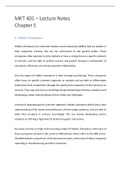Summary
Summary US Civil Rights - condensed revision notes of African Americans
Very condensed revision notes on African Americans as part of the OCR History Course on Civil Rights in the USA. IDEAL for revision and for writing essays. Got me 100 UMS. See bundle for entire course notes. More than 50% off.
[Show more]












